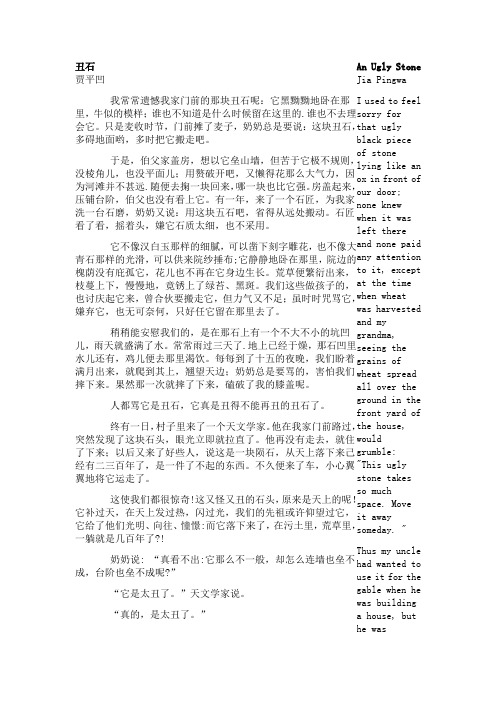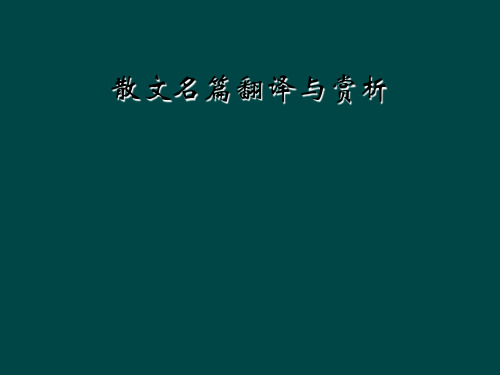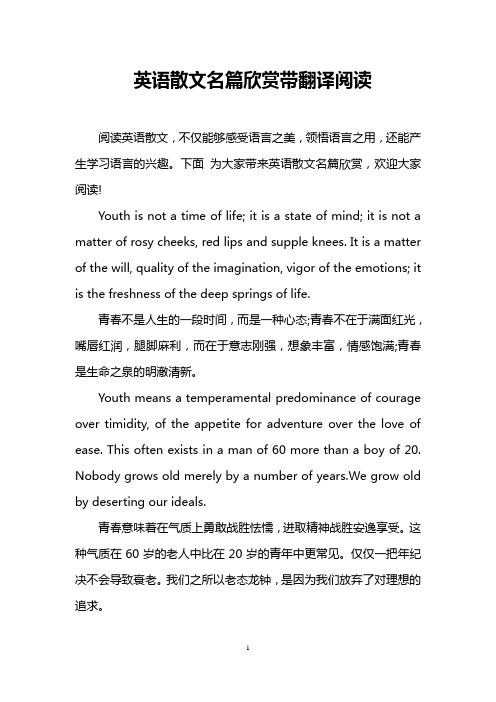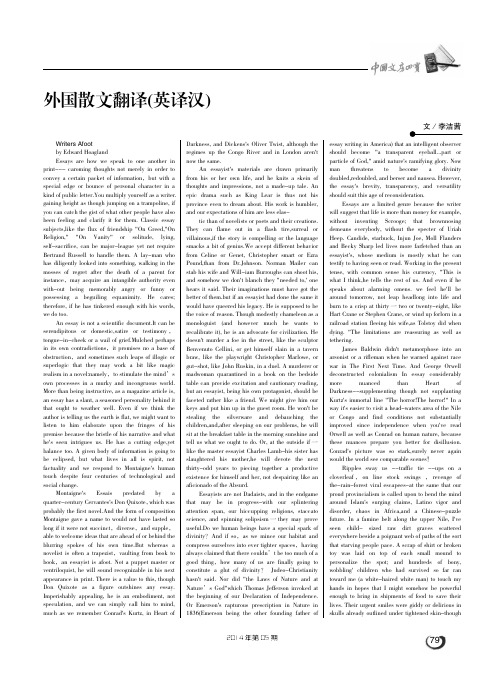中外散文选读部分(上)翻译
经典散文翻译中翻英(精)

丑石贾平凹 我常常遗憾我家门前的那块丑石呢:它黑黝黝地卧在那里,牛似的模样;谁也不知道是什么时候留在这里的.谁也不去理会它。
只是麦收时节,门前摊了麦子,奶奶总是要说:这块丑石,多碍地面哟,多时把它搬走吧。
于是,伯父家盖房,想以它垒山墙,但苦于它极不规则,没棱角儿,也没平面儿;用赘破开吧,又懒得花那么大气力,因为河滩并不甚远.随便去掬一块回来,哪一块也比它强。
房盖起来,压铺台阶,伯父也没有看上它。
有一年,来了一个石匠,为我家洗一台石磨,奶奶又说:用这块五石吧,省得从远处搬动。
石匠看了看,摇着头,嫌它石质太细,也不采用。
它不像汉白玉那样的细腻,可以凿下刻字雕花,也不像大青石那样的光滑,可以供来院纱捶布;它静静地卧在那里,院边的槐荫没有庇孤它,花儿也不再在它身边生长。
荒草便繁衍出来,枝蔓上下,慢慢地,竟锈上了绿苔、黑斑。
我们这些做孩子的,也讨庆起它来,曾合伙要搬走它,但力气又不足;虽时时咒骂它,嫌弃它,也无可奈何,只好任它留在那里去了。
稍稍能安慰我们的,是在那石上有一个不大不小的坑凹儿,雨天就盛满了水。
常常雨过三天了.地上已经于燥,那石凹里水儿还有,鸡儿便去那里渴饮。
每每到了十五的夜晚,我们盼着满月出来,就爬到其上,翘望天边;奶奶总是要骂的,害怕我们摔下来。
果然那一次就摔了下来,磕破了我的膝盖呢。
人都骂它是丑石,它真是丑得不能再丑的丑石了。
终有一日,村子里来了一个天文学家。
他在我家门前路过,突然发现了这块石头,眼光立即就拉直了。
他再没有走去,就住了下来;以后又来了好些人,说这是一块陨石,从天上落下来己经有二三百年了,是一件了不起的东西。
不久便来了车,小心翼翼地将它运走了。
这使我们都很惊奇!这又怪又丑的石头,原来是天上的呢!它补过天,在天上发过热,闪过光,我们的先祖或许仰望过它,它给了他们光明、向往、憧憬:而它落下来了,在污土里,荒草里,一躺就是几百年了?!奶奶说: “真看不出:它那么不一般,却怎么连墙也垒不成,台阶也垒不成呢?” “它是太丑了。
散文名篇翻译与赏析

CHAPTER
02
节选赏析
蔷薇的花色还是鲜艳的,一朵紫 红,一朵嫩红,一朵是病黄的象 牙色中带着几分血晕。 They were still fresh in colour. One was purplish-red, another pink, still another a sickly ivory-yellow slightly tinged with blood-red.
Rambling through a pine forest early in the morning, I came across a bunch of forsaken roses lying by the shady wayside. They were still fresh in colour. One was purplish-red, another pink, still another a sickly ivory-yellow slightly tinged with blood-red.
亮点: 原文句式的复原,保存原文
的感情色彩。
CHAPTER
03
我的看法
我的看法
一、贴近英语母语读者的阅读习惯 二、尽量保持原文句式构造的稳定 三、尽量复原原文作者的感情抒发
谢谢!
散文名篇翻译与赏析
目 录
CONTENTS
01 全文阅读 02 节选赏析 03 我的看法
CHAPTER
01
全文阅读
清晨往松林里去漫步,我在林荫路畔 发现了一束被人遗弃了的蔷薇。蔷薇
经典散文英语短篇附中文翻译

经典散文英语短篇附中文翻译中国六朝以来,为区别韵文与骈文,把凡不押韵、不重排偶的散体文章(包括经传史书),统称“散文”。
后又泛指诗歌以外的所有文学体裁。
今天为大家奉上经典散文英语短篇,时间难得,何不深入了解一下让自己的收获更多呢?经典散文英语短篇(一)转眼青春的散场青春的字眼慢慢的觉得陌生,年轮总是很轻易的烙下苍老的印记。
以为总是长久的东西,其实,就在转神与刹那间便不在身边了。
曾经深爱、思念着的人便轻易的变成了曾经熟悉的陌生人。
曾经纯真无邪,曾经美丽梦想,随着四季轮回慢慢的散尽……这就是青春,在岁月里的转身,从一个熟悉到另外一个陌生,再从陌生转变到熟悉,直至一场场的青春的帷幕渐渐的落幕。
在青春的酸甜苦乐里稚气里的幻想慢慢的褪去。
“Youth” seems to be fading away in my life, only leaving me some unforgettable and cherished memories. Something that we used to think would last forever in our lives, had actually vanished in a second before we realized it. Those who we used to deeply love or miss, have now become the most acquainted strangers. Our once pure and beautiful dream, is gradually fading away with time passing by……This is youth, which is indeed an endless cycle from familiarity to strangeness, and from strangeness to familiarity, until the curtain of our youth is closing off little by little, along with our childish fantasies.人就是这样一种奇怪的动物,拥有的时候厌倦,失去回首的时候才酸痛。
英语散文名篇欣赏带翻译阅读

英语散文名篇欣赏带翻译阅读阅读英语散文,不仅能够感受语言之美,领悟语言之用,还能产生学习语言的兴趣。
下面为大家带来英语散文名篇欣赏,欢迎大家阅读!Youth is not a time of life; it is a state of mind; it is not a matter of rosy cheeks, red lips and supple knees. It is a matter of the will, quality of the imagination, vigor of the emotions; it is the freshness of the deep springs of life.青春不是人生的一段时间,而是一种心态;青春不在于满面红光,嘴唇红润,腿脚麻利,而在于意志刚强,想象丰富,情感饱满;青春是生命之泉的明澈清新。
Youth means a temperamental predominance of courage over timidity, of the appetite for adventure over the love of ease. This often exists in a man of 60 more than a boy of 20. Nobody grows old merely by a number of years.We grow old by deserting our ideals.青春意味着在气质上勇敢战胜怯懦,进取精神战胜安逸享受。
这种气质在60岁的老人中比在20岁的青年中更常见。
仅仅一把年纪决不会导致衰老。
我们之所以老态龙钟,是因为我们放弃了对理想的追求。
Years may wrinkle the skin, but to give up enthusiasm wrinkles the soul. Worry, fear, self distrust blows the heart and turns the spirit back to dust.岁月的流逝会在皮肤上留下皱纹,而热情的丧失却会给灵魂刻下皱纹。
唐宋八大家散文选读重点句子翻译

唐宋八大家散文选读重点句子翻译
《原毁》
1、古之君子,其责己也重以周,其待人也轻以约。
重以周,故不怠;轻以约,故人乐为善。
译:古时候的君子,他要求自己严格而全面,他对待别人宽容又简约。
严格而全面,所以不怠惰;宽容又简约,所以人家都乐意做好事。
2、彼人也,能有是,是足为良人矣;能善是,是足为艺人矣。
译:又不应当对他约束太严,对他逼迫催促,使他像牛马那样,逼迫催促太急就会坏事。
《朋党论》
3、夫治乱兴亡之迹,为人君者,可以鉴矣!
译:这些治乱兴亡的史迹,做君王的,可以把它们引为鉴戒呢!
《留侯论》
1、天下有大勇者,卒然临之而不惊,无故加之而不怒。
此其所挟持者甚大,而其志甚远也。
译:天下真正勇敢的人,遇到突发的情形毫不惊慌,无故受到侮辱时却不愤怒。
这是因为他们抱负很大,志向很远.。
《进学解》
1、业精于勤,荒于嬉;行成于思,毁于随。
译:学业精进由于勤奋,荒废由于嬉戏玩乐;德行养成由于思考,败坏由于因循随俗。
3、然而公不见信于人,私不见助于友。
跋前踬后,动辄得咎。
《日喻》
3、故凡不学而务求道,皆北方之学没者也。
散文翻译

“任何卓越都来自于精于求精的态度和近乎苛刻的标准。
”瑞士著名腕表设计师穆勒的这句名言告诉我们:用什么样的标准要求自己,决定着一个人成就的大小。
标准低一些,自然更轻松,但也更容易小富即安、止步不前;标准高一些,必然需要更多的付出,更多的努力,做出来的事情也一定更加出色。
“不经一番彻骨寒,哪得梅花扑鼻香”,凡成功者,无不是以近乎苛刻的严要求磨练自己,以他人难以企及的高标准无悔付出,才最终成就了自己。
欲登临多高的山峰,你必先对自己有多高的要求。
你用什么样的标准要求自己?不是落后于你的人的标准,也不是你自己的标准,而是那些比你做得好,比你成功的人的标准,甚至更高的标准。
在一个标准要求宽松的流水线上,是生产不出高质量的产品的。
任何人的成功也都是建立在他比别人做得好的基础上的。
不要放松对自己的要求,对自己严格一些吧。
“ All excellence comes from excelsior attitude and almost demanding standards.” This saying of Muller who is the famous Swiss watch designer tells us what kind of standard you use to measure yourself determines the size of your achievements. If you measure yourself by a lower standard, you will feel more relax, but you will also be more easily to be satisfied with the status quo and come to a halt; If you measure yourself by a higher standard, you will have to exert more effort to make things better and make you more excellent. “Wintersweet can’t bloom so well without suffering from the continuous bitter cold .” All achievers hone themselves by almost demanding standards and pay without regrets by a high standard which others can’t match. Then they achieve success eventually.The height of the mountain you can reach depends on the standard you use to measure yourself. What kind of standard you should use to measure yourself? It is not the standard that the people who fall behind you use or you use, but the standard that the people who are better and more successful than you use. Or you should use even higher standard. It is impossible to produce high-quality products in an assembly line which is required in a low and loose standard. Everyone’s success is based on what he did that is betterthan others. Don’t slack off and be strict with yourself.。
外国散文翻译(英译汉)

2014年第05期79外国散文翻译(英译汉)文/李洁茜Writers Afootby Edward HoaglandEssays are how we speak to one another in print--- caroming thoughts not merely in order to convey a certain packet of information ,but with a special edge or bounce of personal character in a kind of public letter.You multiply yourself as a writer. gaining height as though jumping on a trampoline, if you can catch the gist of what other people have also been feeling and clarify it for them. Classic essay subjects,like the flux of friendship "On Greed,''On Religion," "On Vanity" or solitude, lying, self-sacrifice, can be major-league yet not require Bertrand Russell to handle them. A lay-man who has diligently looked into something, walking in the mosses of regret after the death of a parent for instance ,may acquire an intangible authority even with-out being memorably angry or funny or possessing a beguiling equanimity. He cares; therefore, if he has tinkered enough with his words, we do too.An essay is not a scientific document.It can be serendipitous or domestic,satire or testimony ,tongue-in-cheek or a wail of grief.Mulched perhaps in its own contradictions ,it promises no a base of obstruction ,and sometimes such leaps of illogic or superlogic that they may work a bit like magic realism in a novel:namely ,to stimulate the mind ’s own processes in a murky and incongruous world. More than being instructive, as a magazine article is, an essay has a slant, a seasoned personality behind it that ought to weather well. Even if we think the author is telling us the earth is flat, we might want to listen to him elaborate upon the fringes of his premise because the bristle of his narrative and what he's seen intrigues us. He has a cutting edge,yet balance too. A given body of information is going to be eclipsed, but what lives in all is spirit, not factuality and we respond to Montaigne's human touch despite four centuries of technological and social change.Montaigne's Essais predated by a quarter-century Cervantes's Don Quixote ,which was probably the first novel.And the form of composition Montaigne gave a name to would not have lasted so long if it were not succinct ,diverse ,and supple ,able to welcome ideas that are ahead of or behind the blurring spokes of his own time.But whereas a novelist is often a trapezist ,vaulting from book to book ,an essayist is afoot. Not a puppet master or ventriloquist, he will sound recognizable in his next appearance in print. There is a value to this, though Don Quixote as a figure outshines any essay. Imperishably appealing, he is an embodiment, not speculation, and we can simply call him to mind, much as we remember Conrad's Kurtz, in Heart ofDarkness, and Dickens's Oliver Twist, although the regimes up the Congo River and in London aren't now the same.An essayist's materials are drawn primarily from his or her own life, and he knits a skein of thoughts and impressions, not a made-up tale. An epic drama such as King Lear is thus not his province even to dream about. His work is humbler, and our expectations of him are less elas-tic than of novelists or poets and their creations. They can flame out in a flash tire,surreal or villainous,if the story is compelling or the language smacks a bit of genius.We accept different behavior from Celine or Genet, Christopher smart or Ezra Pound,than from Dr.Johnson. Norman Mailer can stab his wife and Will-iam Burroughs can shoot his, and somehow we don't blanch they "needed to,' one hears it said. Their imaginations must have got the better of them.but if an essayist had done the same it would have queered his legacy. He is supposed to be the voice of reason. Though modestly chameleon as a monologuist (and however much he wants to recalibrate it), he is an advocate for civilization. He doesn't murder a foe in the street, like the sculptor Benvenuto Cellini, or get himself slain in a tavern braw, like the playwright Christopher Marlowe, or gut-shot, like John Ruskin, in a duel. A murderer or madwoman quarantined in a book on the bedside table can provide excitation and cautionary reading, but an essayist, being his own protagonist, should be faceted rather like a friend. We might give him our keys and put him up in the guest room. He won't be stealing the silverware and debauching the children,and,after sleeping on our problems, he will sit at the breakfast table in the morning sunshine and tell us what we ought to do. Or, at the outside if 一like the master essayist Charles Lamb-his sister has slaughtered his mother,he will devote the next thirty-odd years to piecing together a productive existence for himself and her, not despairing like an aficionado of the Absurd.Essayists are not Dadaists, and in the endgame that may be in progress-with our splintering attention span, our hiccupping religions, staccato science, and spinning solipsism 一they may prove useful.Do we human beings have a special spark of divinity ?And if so ,as we mince our habitat and compress ourselves into ever tighter spaces ,having always claimed that there couldn ’t be too much of a good thing ,how many of us are finally going to constitute a glut of divinity ? Judeo-Christianity hasn't said. Nor did "the Laws of Nature and at Nature ’s God''which Thomas Jefferson invoked at the beginning of our Declaration of Independence. Or Emerson's rapturous prescription in Nature in 1836(Emerson being the other founding father ofessay writing in America) that an intelligent observer should become "a transparent eyeball...part or particle of God," amid nature's ramifying glory. Now man threatens to become a divinity doubled,redoubled, and berser and nausea. However, the essay's brevity, transparency, and versatility should suit this age of reconsideration.Essays are a limited genre because the writer will suggest that life is more than money for example, without inventing Scrooge; that brownnosing demeans everybody, without the specter of Uriah Heep. Candide, starbuck, Injun Joe, Moll Flanders and Becky Sharp led lives more farfetched than an essayist's, whose medium is mostly what he can testify to having seen or read. Working in the present tense, with common sense his currency, "This is what I think,he tells the rest of us. And even if he speaks about alarming omens. we feel he'll be around tomorrow, not leap headlong into life and burn to a crisp at thirty 一two or twenty-eight, like Hart Crane or Stephen Crane, or wind up forlorn in a railroad station fleeing his wife,as Tolstoy did when dying. "The limitations are reassuring as well as tethering.James Baldwin didn't metamorphose into an arsonist or a rifleman when he warned against race war in The First Next Time. And George Orwell deconstructed colonialism In essay considerably more nuanced than Heart of Darkness--supplementing though not supplanting Kurtz's immortal line "The horror!The horror!'' In a way it's easier to visit a head-waters area of the Nile or Congo and find conditions not substantially improved since independence when you've read Orwell as well as Conrad on human nature, because these nuances prepare you better for disillusion. Conrad's picture was so stark,surely never again would the world see comparable scenes !Ripples sway us --traffic tie --ups on a cloverleaf ,on line stock swings ,revenge of the-rain-forest viral escapees-at the same that our proud provincialism is called upon to bend the mind around Islam's surging claims, Latino vigor and disorder, chaos in Africa,and a Chinese-puzzle future. In a famine belt along the upper Nile, I've seen child- sized raw dirt graves scattered everywhere beside a poignant web of paths of the sort that starving people pace. A scrap of shirt or broken toy was laid on top of each small mound to personalize the spot; and hundreds of bony, wobbling' children who had survived so far ran toward me (a white-haired white man) to touch my hands in hopes that I might somehow be powerful enough to bring in shipments of food to save their lives. Their urgent smiles were giddy or delirious in skulls already outlined under tightened skin-thoughW文学色彩E N X U E S E C A Ithey were fatalistic,almost docile, too, because so many adults had told them for so many weeks that there was nothing to eat and so many people whom they knew had died. I interviewed the Sudanese guerrilla general who was in charge of protecting them about what could be done, but he was delayed a little that afternoon because (I found out later from an Amnesty International report) he had been torturing a colleague by pounding a nail through his foot. Ripples sway us --traffic tie --ups on a cloverleaf,on line stock swings ,revenge of the-rain-forest viral escapees-Now essayists in dealing with the present tense are stuck with the nuts and bolts of what's going on. And what do you say about that endgame on the Nile, which I believe was a forerunner,not an anomaly?I expect an epidemic of disintegration in other forms. Essayists will become ' journeymen," in a new definition for that hackneyed term:out on the rim, seeing what's in store. The cataract of memoirs being published currently may be a prelude to this-memoirs of a cascading endgame. Yet essayists are not nihilists as a rule.They look for context. They feel out traction.They have a stake in society’s survival,behavior,for instance,in a manner that most fiction writers would eschew because an essayist’s opinions are central,part of the very protein that he gives us.Not omniscient like a novelist, who can create a world he wants to work with, he has the job of finding coherence in the world that we already have. This isn't harder, just a different task. And he usually comes to it in middle age, having acquired some ballast of experience and tested views---may indeed have written several novels, because of the higher glamour and freedom of that calling. (For what it's worth,I sold my first novel at twenty-one and wrote my first thirty-five.)"Art is not truth. Art is a lie that makes us realize truth''as Picasso said; and to capture within an imagined story some petal of human longing and defeat is an achievement irresistibly appealing.Essayists,by denying themselves that license to extravagantly fudge the facts of first-hand observation,relegate themselves to the Belles Lettres section of the bookstore,neither fiction nor journalism,because they do partly fudge their reportage,adding the spice of temperament and a lifetime’s favorite reading.And if an enigma seems a jigsaw they will tend to see a picture in it: that life therefore is not an oubliette'. The fracases they get into are on behalf of democracy as they see it (Montaigne, Orwell, and Baldwin again are examples),and their iconoclasm commonly leans toward the ideal of comforting the afflicted and afflicting the comfortable’’which journalists used to aspire to. Like a short-story writer, an essayist is after the gist of life, not Balzacian documentation. And, like a soothsayer with a chicken's entrails, he will spread his innards" out before us to discern a pattern. Not just confessional, however, a good es-say is driven by the momentum of an inquiry, searching out a point, such as are we divine?一an awfully big one for a lowly essayist, but it may be the question of the coming centuryEssayists also go to the fights, or rub shoulderson the waterfront, get divorced ("Ouch," says thereader, "that was like mine"), nibble canapes",playing off theirpreconceptions of a celebrity or a politician againstreality. they will examine a prejudice (is thispiquant or ignoble, educated or soggy?or dare a piein the face for advancing an out of fashion idea。
散文选读上译文

第一课;哲学何用?[英]约翰·波顿·桑德森·霍尔丹著敏译最近亚历山德罗夫和他的四位同事凭借一部三卷本的哲学史著作获得斯大林荣誉勋章和20万卢布的奖金。
其他奖章则大多授予科学家。
一定有很多人会说:“怎么能把他们和科学家相提并论呢?他们只是描述很多古人的观点,大多还是错的。
当然研究这个有点意思,就像研究童话或是占星术的历史。
但它没多大用处,尤其在形势严峻的当前。
”其实我们大有理由研究过去的哲学家说过什么。
首先,哲学史和科学史紧密相连、不可分割。
哲学主要探讨未知领域的问题,这些问题大多数人都没有确切答案,仅有几个有答案的人还意见相左。
通过探讨提高认识,哲学便会催生出更多的科学分支。
以古代和中世纪哲学家探讨运动为例。
亚里士多德和圣托马斯·阿奎那告诉我们,运动的物体如果没有持续的外力驱动就会慢下来。
他们错了。
运动的物体会保持运动,除非有外力让它们停下来。
但他们有很好的论据来支持他们的论点。
研究了这些观点,并了解能够驳倒它们的实验,我们就能从中吸取经验,在今天的科学论争中去伪存真。
我们也能在每个哲学家身上看到他所在时代的社会生活的影子。
柏拉图和亚里士多德生活在古希腊的奴隶制社会,他们认为人类最高级的存在形式是脑力思考而不是体力劳动,体现了奴隶主的利益。
生活在中世纪的圣托马斯坚信天使分为九级,有森严的封建等级制度,又体现了封建统治者的利益。
赫伯特·斯宾塞处于资本家自由竞争的时代,认为适者生存是进步的关键。
因此,马克思主义作为支持工人阶级的哲学也是与时代相适应的,工人阶级是唯一有希望的阶级。
但设想几个世纪后,人类已经经历好几代的共产主义生活,认为人与人之间亲如兄弟是再自然不过的事,不是为之奋斗的理想,而是现实生活,同时心里又清楚这种亲密关系是经过艰苦卓绝的斗争才实现的。
他们眼中的世界又会是怎样呢?我们很难想象。
哲学研究能使我们的观点不至于僵化。
我们每个人都常理所当然地认同某些普遍观点,把它们称作常识。
- 1、下载文档前请自行甄别文档内容的完整性,平台不提供额外的编辑、内容补充、找答案等附加服务。
- 2、"仅部分预览"的文档,不可在线预览部分如存在完整性等问题,可反馈申请退款(可完整预览的文档不适用该条件!)。
- 3、如文档侵犯您的权益,请联系客服反馈,我们会尽快为您处理(人工客服工作时间:9:00-18:30)。
●● 2 How to Grow Old[A]1. Did all Russell's ancestors live to a ripe old age?No, they didn't. His maternal grandfather died at 67 and one of his remoter ancestors did not die a natural death.2.How did his maternal grandmother keep herself occupied after she became a widow? What was her attitude towards her grandchildren?She did that by devoting herself to women's higher education, specifically to opening the medical profession to women. Her attitude towards her grandchildren was impersonal.3. According to the author, what is the proper recipe for remaining young?To have wide and keen interests and to be engaged in some related activities.4. What dangers does the author think one should guard against in old age?One is excessive absorption in the past, and the other is undue dependence on the young for getting vigour from its vitality.5. What attitude should be adopted towards one's grown-up children?Accepting the fact that they are grown-ups now and leave them to live their own lives.6. Why is it no use telling grown-up children not to make mistakes?One reason is that grown-up children do not accept what their parents tell them.The other reason is that no one can avoid making mistakes. So we may say that everyone learns from his own mistakes.7. What, in the opinion of the author, is the best way for an old person to overcome the fear of death?The best way is to make one's interests gradually wider and more impersonal, or to make one's life increasingly merged in the universal life.[B]1. Do you agree with the author's views on old age and death? State your reasons.Yes. An active and independent old age is good way to keep young..2. What does the author compare the life of an individual to?A river.3. Are the author's views in this essay to be taken seriously through out?Not through out. The author was joking when he said that one should choose one's ancestors carefully.4. Comment on the sentence 'Young men who have reason to fear that they will be killed in battle may justifiably feel bitter in the thought that they have been cheated of the best things that life has to offer.'The author means that the fear of death in young people may be justified because they have not tasted the best things of life.On the other hand, the author is suggesting that the fear of death in the old is not as acceptable - because he has known human joys and sorrows.We may further say that the author is urging the old to accept the fact of human life, that man has a limited lifetime. So if one has had his share of human joys and sorrows, one should be ready to accept that fact he is near the end of his life.II Paraphrasing1. If this is true it should be forgotten, and if it is forgotten it will probably not be true.If it is true that one's emotions used to be more vivid and one's mind used to be more keen, one should try to forget that. And if one can really forget that, who can say for certain that one is older or lower than one used to be.2. One's interest should be contemplative and, if possible, philanthropic, but not unduly emotional.One should have impersonal interests and one should not concern oneself too much with one's children and grandchildren.3. It is in this sphere that long experience is really fruitful, and it is in this sphere that the wisdom born of experience can be exercised without being oppressive."this sphere" refers to "appropriate activities"Only in appropriate activities is long experience helpful and is the wisdom brought by experience useful - otherwise it is unbearable.●●5 As I see it[A]1. What do you think made Shaw give this radio talk in 1937?To urge the British people to be conscientious objectors of war and to make them realize that to be a pacifist in the present war is not the right attitude and that the British should change the distribution system in order to avoid the most dangerous war between Capitalism and Communism.2. What was happening in Spain and China?Spain and China were both at war at that time. Japan invaded China and Spain was in a civil war.3. Are the horrors of war as described by Shaw real or imaginary?Some are real and some are imaginary. The description of the street scenes was real in Spain and China, but in 1937 London or Paris were not yet in the danger of being bombed by any enemy country.4. Why did Shaw hate war?Because of the loss of human lives on both side at war - besides the dangers of war.5. Did Shaw give his whole-hearted support to the pacifist movement against war?No, he thought at that moment the pacifist movement was a wrong movement. Because Mussolini and Hitler did not let others live, so people should not tolerate them and must fight against them.6. What kind of war did Shaw think would put an end to civilization?The war between Capitalism and Communism, or between landowning and labour.7. What was wrong with Britain according to Shaw?Its distribution system is unfair and unjust and its people are not any taking actions to change the situation - they only keep talking about it.8. Was Shaw optimistic? Or did he end his speech on a note of despair?No, he was not optimistic and there is a note of despair when he came to the end of his speech. As he said, "nobody takes any notice" of what he had said.[B] 1. What are conscientious objectors?(出于道德或宗教上的原因而)拒绝服兵役的人,不积极参与任何有关战争行动的人。
